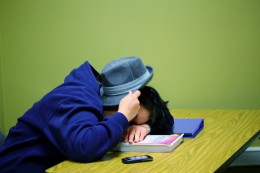Choosing to Skip College

In the new issue of Philadelphia Magazine, Grace Jay-Benjamin recounts touring colleges with her parents, and deciding at her first stop at McGill University that she actually didn’t want to go to college. Benjamin had attended Greenfield Elementary, which she says has one of the best reputations in the city, but when she complained about disliking school, her parents pulled her out to attend the Philadelphia School, where students called their teachers by their first names and did much of their learning during weekly field trips. Benjamin didn’t want to be stuck in an academic setting that didn’t feel right for her, (nor saddle herself with any kind of student debt). She also wasn’t sure what she wanted to do with her life, and didn’t think college was the right way for her to figure that out:
When conversations turned to what college I’d be heading to in the fall (as they often did), it was clear that my decision was bold but not unfounded. Business degrees and the sciences weren’t for me — I wasn’t interested in being an engineer or a computer programmer, a lawyer or a marketing major. Like most of my friends, I had no idea what I wanted to study. I would have most likely concentrated on one of the countless humanities majors. Art history or English would have been fascinating, but four years later, I would have been in a pool of highly educated graduates with no actual skills.
Traditional education is under attack, and my trepidation was in synch with the unavoidable data: College prices are soaring; the post-graduation job market is weak; online education is challenging the idea of what one truly gets out of going to school.
The newsmakers of my generation are the ones who took the traditional way of doing things and flipped it upside down. You never hear those people saying that college was their catalyst. Their message is bigger: To be successful today, the most important thing one needs is gumption.
There’s a difference between doing a liberal arts degree with the intention of becoming a social worker or teacher or reporter, and doing a liberal arts degree by default due to a lack of career ambition, and Benjamin makes a good point about that. But success isn’t just predicated on gumption. Benjamin, after all, had two parents who she describes as two “accomplished people” with “impressive careers” who had the resources to find the right kind of primary and secondary schools for her to thrive in. After having long discussions about what not going to college may mean for her, they allow Benjamin to live at home and “would supplement [her] financially, just as they would have if [she’d] gone to college” while she figured out a way to become financially independent from them. Her parents buy an “investment property” and allow her to live in it with a discount on rent as long as she and her roommates fix it up. Benjamin ends up working in real estate, but also going to art shows and doing volunteer work.
Not going to college wasn’t an option for me, but I can envision what that might have looked like: I would have been kicked out of the house for disobeying my parents’ wishes and would have had to figure out how I’d be able to live on the $7 an hour I was earning working in retail. Would I have been able to explore my own interests or found the time to do so? I think, perhaps, I would have ended up in college after a year of not making much progress.
Benjamin is still figuring it out. “Maybe one day I’ll even find myself walking onto a university campus,” she says. “If so, I know I’ll be there with purpose.”
Photo: Pink Sherbert Photography
Support The Billfold
The Billfold continues to exist thanks to support from our readers. Help us continue to do our work by making a monthly pledge on Patreon or a one-time-only contribution through PayPal.
Comments